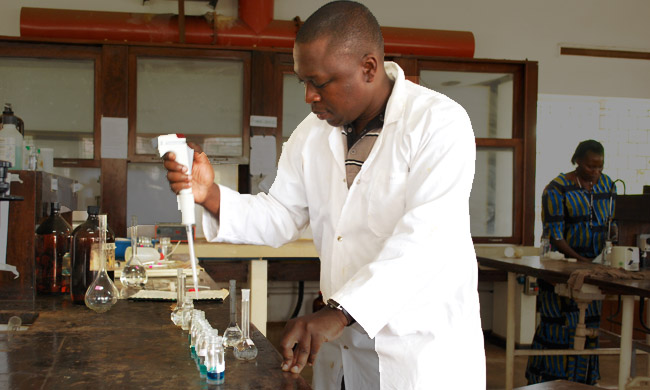At just 24 years old, Simon Mungudit from the College of Natural Sciences (CoNAS) has etched his name in the academic history of Makerere University, having emerged as the overall best male student in the Sciences, an achievement earned through perseverance, discipline, and an unrelenting pursuit of excellence.
Mungudit is set to graduate during 76th graduation ceremony scheduled for 24th to 27th February 2026, having attained a CGPA of 4.76 in the Bachelor of Science in Petroleum Geoscience and Production. His academic interests-Reservoir Engineering, Petrophysics, and Drilling-reflect a deep understanding of the subsurface sciences that power modern energy systems.
Early Life and Journey to Academic Excellence
Born to Mr. Owor Thomas, a Game Ranger with the Uganda Wildlife Authority at Murchison Falls National Park, and Ms. Lilly Obewun Grace of Akuru Bridge Village, Nyaravur Sub-County in Nebbi District, Mungudit’s journey to academic excellence began far from the lecture halls of Makerere. At Karuma Primary School, Mungudit scored 12 aggregates in the Primary Leaving Examinations (PLE), setting the pace for his future success. He proceeded to St. Daniel Comboni College, Nebbi, where he attained 14 aggregates in 8 subjects at O’ Level. He then joined Namilyango College, one of the best secondary schools in Uganda, where he studied Physics, Chemistry, and Mathematics (PCM) and scored 19 points, results that secured him government sponsorship to pursue a Bachelor of Science in Petroleum Geoscience and Production at Makerere University.
Gratitude to his mentors and sponsors
Behind these milestones lies a story of humility, gratitude and opportunity. Mungudit credits his parents for supporting his primary and O’ Level education and expresses gratitude to TotalEnergies, which provided a full bursary for his A’ Level studies, covering tuition, upkeep, and medical care. He also acknowledges the Government of Uganda for sponsoring his university education, a factor he says motivated him to excel.
At Makerere, Mungudit thrived in an environment that blended rigorous academics with mentorship. He pays tribute to his lecturers, particularly Dr. Arthur Batte, Head, Department of Geology and Petroleum Studies, for their unwavering commitment to nurturing students and pushing them to excel.
“I always aimed to excel,” Mungudit says. “Together with a few colleagues, we formed a group and held discussions on a daily. This, coupled with a conducive study environment, prayer, and discipline, enabled us to attain excellent grades.”
Dr Arthur Batte describes Mungidit as a humble yet very intelligent student.
Achievements and Professional Experience
Beyond academics, Mungudit consistently demonstrated expertise in petroleum engineering. In 2024, he led a team that won the Reservoir Modelling Challenge, organized by the American Association of Petroleum Geologists (AAPG) Makerere University Chapter, earning prize money and a sponsored field trip to the Tilenga Project courtesy of COSL. He was First Runner-Up in the Petro Bowl competitions of 2023 and 2025, a highly competitive petroleum knowledge quiz organized by the Society of Petroleum Engineers (SPE) Uganda Section. He served as a Student Officer for the SPE Makerere University Chapter in 2023, and in 2024, he chaired the Organizing Committee of the SPE Annual Students’ Technical Conference and Exhibition, helping bridge the gap between academia and industry.
His learning extended beyond the classroom. During his internship, he worked with TotalEnergies, where he applied petrophysics skills to analyze gas-while-drilling data for formation evaluation, hands-on exposure that sharpened his professional competence. At Makerere University, he mastered PetroMod 2018, a critical software tool in oil and gas exploration. After completing his studies in June 2025, Mungudit trained with the Uganda National Oil Company (UNOC), participating in the 2D seismic acquisition in the Kasurubani Block in Buliisa and Hoima districts.
Mungudit currently works as the Special Projects Coordinator for the Society of Petroleum Engineers (SPE) Uganda Section Student Liaison Committee.
Future Plans
Mungudit hopes to work in the oil and gas industry in the upstream sector as a geoscientist. He also plans to pursue further studies in petroleum engineering.
From a village in Nebbi to the forefront of petroleum geoscience, Mungudit’s story is one of an opportunity seized and potential realized. It is a testament to what is possible when talent meets support, and when determination is guided by faith, mentorship, and service. As Uganda’s oil and gas sector continues to evolve, Mungudit stands as a symbol of the skilled, principled professionals poised to shape its future.
The CoNAS fraternity congratulates Mungudit on this noble achievement.
View on CoNAS


 General1 week ago
General1 week ago
 General1 week ago
General1 week ago
 Health3 days ago
Health3 days ago
 General1 week ago
General1 week ago
 General1 day ago
General1 day ago


